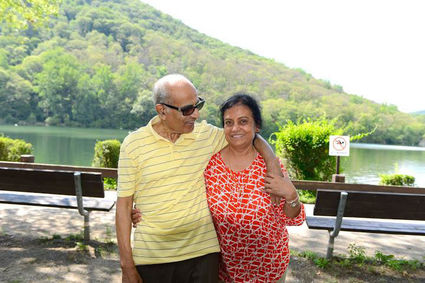Sixty-six and still a caregiver – facing the future
January 1, 2018

Courtesy Diverse Elders Coalition
Ashvin and Bharti Parikh on a picnic. Since he was diagnosed with Parkinson's disease, Bharti has been his caregiver.
By all accounts, Bharti Parikh, 66, has led an exciting life: from a childhood in the tiny village of Patton in Gujarat, India, to a law degree and fulfilling years in America that included working for the City of New York, being invited to be an artist at President Clinton's inauguration, and being a singing star on TV.
However, there's also another sadder, more stressful side to her story, one that is unfortunately shared by so many older adults in America. Bharti Parikh is a caregiver, and has had to be one for years. A senior herself, she continues to care for her husband who has Parkinson's disease.
Her husband cannot use Medicaid, which pays for two-thirds of long-term care in the U.S., because it requires clients to be impoverished to qualify for benefits. Because of their income and their savings, the couple do not qualify. Bharti is one of those millions in America who are trying to pay for long-term care through savings, private insurance and family resources. Aside from the financial toll, caregiving can be physically and emotionally brutal on the caregiver. Caregivers like Bharti who are singlehandedly managing to take care of loved ones often find themselves alone and isolated.
Here is an excerpt of Bharti's story, in her own words:
"My husband was fine until 2009. Then he got Parkinson's Disease. Now the disease is at its worst, and he needs someone to take care of him all the time. I have hired someone to take care of my husband for a few hours a day. Before the aide was hired, I was doing everything for him, and I had no help at all.
I would work from 8 a.m. to 4 p.m. then come home and take care of my kids, mother, father, husband. I would do everything: cooking, getting the groceries, school supplies, sitting with my kids as they did homework, going to PTA meetings, attending their programs and events. It was hard when the kids were small, and I had my mother-in-law with me – she would get sick all the time.
I had to look after everyone. I had no choice. Sometimes my mother was sick, then my husband was sick. It could get very hectic. I can't apply for Medicaid-I have an income, and my husband had an income, I had a job, plus we have savings. So here we are. My daughter, Shephali, and my son-in-law are living with me. They help me take care of my husband and my mother.
Now, my husband is getting worse. But I will spend whatever money I have to take care of him."
Bharti Parikh often brings her husband with her on her visits to India Home, a senior center for South Asian older adults in New York City. Her children, she wanted us to say, have all done well. Her daughter works in the financial sector. The baby with the hole in his heart, Ripal, who was the reason the couple moved to America, is now a pain management specialist. Her eldest son, Nehal, is a neonatologist at Cincinnati Children's Hospital and researches prevention of neurodevelopmental disabilities in high-risk newborns.
To read the rest of Bharti's story on the Diverse Elders Coalition blog, visit http://bit.ly/BhartiParikh.
Meera Venugopal is the Communications and Development Manager for India Home. This article is in an ongoing series from the Diverse Elders Coalition.







